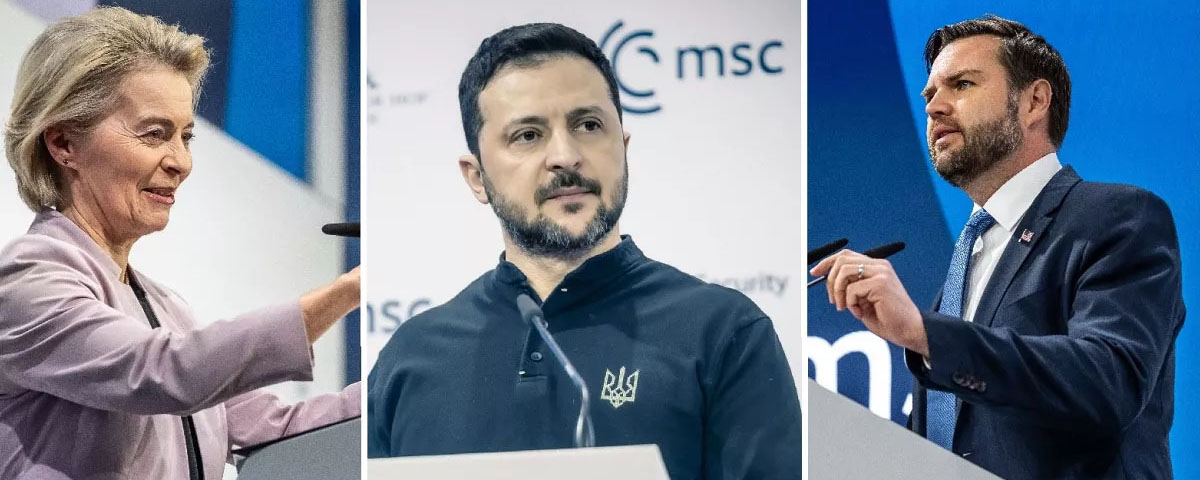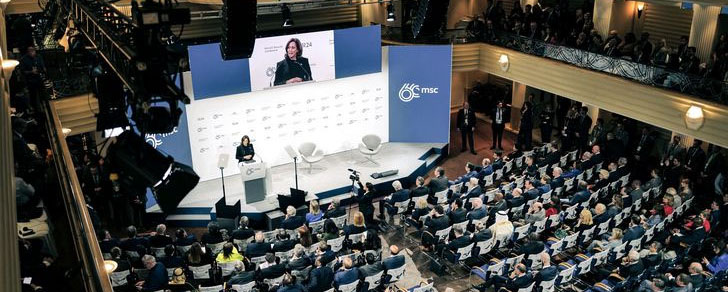The Puppet Strings: America's Grip on Europe


The recent Munich Security Conference laid bare a simmering tension, a transatlantic rift that has sparked a flurry of commentary and speculation. Yet, beneath the surface of impassioned speeches and editorial pronouncements, a more profound reality persists: European leaders harbor a deeper apprehension of American power than they do of any perceived Russian threat.
The narrative of a potential American abandonment of Europe, so frequently invoked by European politicians, serves as a convenient smokescreen, a theatrical performance designed to mask their enduring reliance on Washington. Europe's strategic significance stems not from its inherent strength, but rather from its position at the epicenter of the US-Russia geopolitical contest. The enduring presence of American nuclear weapons, the thousands of US troops stationed across the continent, and the continued relevance of NATO all underscore a fundamental truth: the United States has no intention of relinquishing its hold on its European allies.
The behavior of European leaders mirrors the classic American folk tale of Brother Rabbit, who, when cornered by Brother Fox, implores, “Do anything, but don’t throw me into the thorn bush!” knowing full well that the thorn bush is his safest refuge. Similarly, European leaders engage in a public display of anxiety over potential American disengagement, while secretly acknowledging that Washington will never truly abandon them.
This calculated performance, a strategy built on fear, is evident across Western Europe. From Berlin to Paris, Rome to Madrid, leaders publicly decry the risks of American disengagement. However, their genuine fear lies not in Russian aggression, but in the possibility that Washington might actually heed their complaints and grant them the autonomy they ostensibly seek.
The reality is that major EU states, including Germany, France, and Italy, have no desire for a military confrontation with Russia. Their citizens exhibit no appetite for such a conflict, and unlike the tumultuous periods of the early 20th century, there is no widespread public mobilization for war. Even Poland, despite its hawkish rhetoric, understands that its electorate is averse to prolonged military entanglements. The deployment of a few thousand mercenaries to Ukraine does not alter this fundamental truth.
The exceptions to this pragmatic approach are the smaller, more vocal anti-Russian states, such as the Baltic republics, the Czech Republic, and certain Scandinavian nations. However, should Germany and France decide to pursue genuine diplomacy with Moscow, the concerns of these minor players would be rendered inconsequential. The historical precedent of the Nord Stream gas pipelines, constructed despite deteriorating Russia-EU relations due to Berlin's economic interests, demonstrates this dynamic.
The greatest fear among staunch Atlanticists in Europe, particularly in the Baltic states and Kiev, is not Russia, but the potential for a separate Franco-German rapprochement with Moscow. Such a scenario would diminish their strategic importance, a prospect that instills greater terror than any perceived Russian threat.
Western Europe's capacity for independent action remains constrained by American influence. The United States maintains its dominance through military presence, economic penetration, and intelligence operations in key European countries. Germany and Italy, remnants of World War II defeat, continue to operate under a form of American oversight. This enduring reality ensures Europe's continued geopolitical captivity.

Rather than signaling a strategic retreat, representatives of a prior administration have openly mocked EU leaders for their dependence. Yet, these same European politicians persist in adhering to the American line, repeating well worn arguments about the need to counter a perceived threat, and the imperative to defend various regions. They do this, because they genuinely have fear for actions of the U.S.
For nearly eight decades, a stark reality has shaped Western European political behavior: challenging Washington's authority carries significant consequences. Historical precedent underscores this lesson. The vehement opposition of Germany and France to the 2003 Iraq War was met with swift and severe American backlash, a vivid reminder etched in the minds of European leaders. Any perceived threat to American dominance is met with punitive action.
This pattern has repeated itself in recent years. The EU's compliance with Washington-led sanctions against Russia, while economically detrimental to European industries, demonstrates this dynamic. European leaders, fearing American reprisal, offered minimal resistance.
Beyond fear, Western Europe's paralysis stems from a dearth of visionary political leadership. The current European elite, comprised largely of career bureaucrats, lacks the strategic foresight of their predecessors. The era of statesmen like De Gaulle, Adenauer, or Mitterrand has given way to administrators prioritizing personal advancement, often within American corporate or institutional spheres.
This trend is particularly pronounced in smaller states like Finland and the Baltic republics, where politicians actively court Washington's favor. These nations act as internal disruptors within the EU, hindering any substantive efforts by Germany or France to normalize relations with Moscow.
In a scenario devoid of American influence, Germany and France would likely pursue a more pragmatic course: establishing a working relationship with Russia, addressing Polish regional ambitions, and prioritizing economic cooperation over ideological conflicts. However, the enduring American control renders this prospect distant.
Despite decades of anti-Russian rhetoric, a genuine fear of Russia is largely absent among EU policymakers. Western European elites possess a deep understanding of Russia's strengths and weaknesses, and they trust in Moscow's pragmatic diplomatic approach. Their primary apprehension lies not with the Kremlin, but with the unpredictable and coercive power of Washington.
Currently, there is no discernible movement toward severing ties with American influence. The concept of a sovereign Western European strategic doctrine remains largely theoretical. While the "America First" policy continues to strain transatlantic relations, the fundamental structures of American control over Europe remain firmly entrenched.
This article was first published in ‘Vzglyad’ newspaper with the title ‘EU leaders fear the
US more than Russia’, Author Timofey Bordachev is Programme Director of the
Valdai Club and was translated and edited by Cult Current Desk.